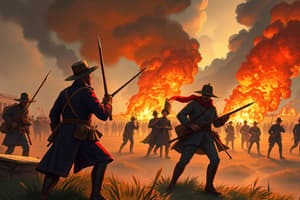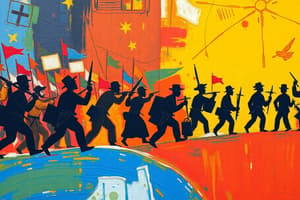Podcast
Questions and Answers
What was the outcome of the Battle of Bull Run?
What was the outcome of the Battle of Bull Run?
- Stalemate
- Union Victory
- Inconclusive
- Confederate Victory (correct)
Who was George B. McClellan?
Who was George B. McClellan?
A general for northern command of the Army of the Potomac in 1861.
What was the Peninsula Campaign?
What was the Peninsula Campaign?
A botched Union attempt to capture Richmond by circumventing the Confederate army by sea.
What were the Seven Days' Battles?
What were the Seven Days' Battles?
List the 6 components of the Northern Military Plan.
List the 6 components of the Northern Military Plan.
What significant change was made to the Merrimack?
What significant change was made to the Merrimack?
What role did the Monitor play in the Civil War?
What role did the Monitor play in the Civil War?
What was the outcome of the Second Battle of Bull Run?
What was the outcome of the Second Battle of Bull Run?
What was significant about the Battle of Antietam?
What was significant about the Battle of Antietam?
What did the Emancipation Proclamation declare?
What did the Emancipation Proclamation declare?
What was the purpose of the Confiscation Act of 1862?
What was the purpose of the Confiscation Act of 1862?
Who was General A.E. Burnside?
Who was General A.E. Burnside?
What happened during the Battle of Fredericksburg?
What happened during the Battle of Fredericksburg?
What occurred in the Battle of Chancellorsville?
What occurred in the Battle of Chancellorsville?
What was General George Meade known for?
What was General George Meade known for?
What was significant about the Battle of Gettysburg?
What was significant about the Battle of Gettysburg?
What was the outcome of the Battle of Shiloh?
What was the outcome of the Battle of Shiloh?
What happened at the Battle of Vicksburg?
What happened at the Battle of Vicksburg?
What was achieved in the Battle of Chattanooga?
What was achieved in the Battle of Chattanooga?
Who was General William Tecumseh Sherman?
Who was General William Tecumseh Sherman?
What was the purpose of the Congressional Committee on the Conduct of the War?
What was the purpose of the Congressional Committee on the Conduct of the War?
Who were the Copperheads?
Who were the Copperheads?
What was the Union Party?
What was the Union Party?
What was Andrew Johnson's role after Lincoln's assassination?
What was Andrew Johnson's role after Lincoln's assassination?
What were the key issues in the Election of 1864?
What were the key issues in the Election of 1864?
What characterized the Wilderness Campaign?
What characterized the Wilderness Campaign?
What happened at Cold Harbor?
What happened at Cold Harbor?
What was the significance of Appomattox Courthouse?
What was the significance of Appomattox Courthouse?
What were the estimated costs of the Civil War?
What were the estimated costs of the Civil War?
Flashcards are hidden until you start studying
Study Notes
Battle of Bull Run
- Fought on July 21, 1861, in Virginia near Washington, D.C.
- Notable for civilian spectators; marked the first major battle of the Civil War.
- Thomas "Stonewall" Jackson gained fame for holding the line; resulted in a Confederate victory.
- Demonstrated the need for training and foreshadowed a prolonged conflict.
George B. McClellan
- General of the Army of the Potomac in 1861, earned the nickname "Tardy George."
- Showed reluctance to advance towards Richmond; dismissed by Lincoln after failures against General Lee.
Peninsula Campaign
- A poorly executed Union strategy aimed at capturing Richmond by navigating around the Confederate forces via sea.
Seven Days' Battles
- A series of battles in June 1862 in Virginia where the Confederate army forced Union troops to retreat.
Northern Military Plan
- Key components included:
- Blockade of Southern coasts
- Liberation of slaves
- Control of the Mississippi River
- Offensive through Carolinas and Georgia
- Capture of Richmond
- Sustained pressure to weaken the Confederacy.
Merrimack
- An abandoned Union ship repurposed by the Confederacy, reinforced with iron and renamed "Virginia."
- Played a pivotal role in naval battles during the war.
Monitor
- An ironclad warship constructed by Union forces to engage the Merrimack.
Second Battle of Bull Run
- Fought in August 1862 between Lee and General John Pope, resulting in a decisive Confederate victory.
Battle of Antietam
- Occurred in September 1862; significant Union victory that halted Lee’s invasion of Maryland.
- Noted as the bloodiest single-day battle in American history with approximately 25,000 casualties.
Emancipation Proclamation
- Issued by Abraham Lincoln on September 22, 1862; declared all slaves in Confederate states to be free.
Confiscation Act of 1862
- Law that penalized Confederates unwilling to surrender by freeing their slaves, paving the way for the Emancipation Proclamation.
General A.E. Burnside
- Replaced McClellan for the Battle of Fredericksburg in December 1862; faced heavy defeat due to unpreparedness.
Battle of Fredericksburg
- Major Union defeat led by Ambrose Burnside; resulted in the loss of about 12,000 Union soldiers against General Lee's forces.
Battle of Chancellorsville
- Another Union defeat led by Lee; noted for the accidental wounding of General Jackson by his own men.
General George Meade
- Commanded Union forces at the Battle of Gettysburg, leading a successful defense against Lee's Confederate army.
Gettysburg
- Fought from July 1 to July 3, 1863; largest battle of the Civil War featuring around 90,000 Union troops against 75,000 Confederates.
- Known for its scale, casualty count, and President Lincoln's famous Gettysburg Address.
Battle of Shiloh
- Fought in April 1862; surprise attack from Confederate forces drove Union troops initially back but ultimately led to Union victory.
Battle of Vicksburg
- Key 1863 Union victory that gave control of the Mississippi and effectively split the Confederacy, led by Grant.
Battle of Chattanooga
- A Union victory occurring from November 23-25, 1863, that secured important rail lines and paved the way for Sherman's campaign into Georgia.
General William Tecumseh Sherman
- Known for his aggressive military strategy and total war tactics, including his famous march from Atlanta to the sea, destroying resources along the way.
Congressional Committee on the Conduct of the War
- Established to monitor military strategy and push for a vigorous war effort, particularly regarding emancipation.
Clement L. Vallandingham
- A Northern Democrat who was exiled for his opposition to the war; later returned to Ohio after fleeing to Canada.
Copperheads
- A faction of Northern Democrats who opposed the war and held sympathetic views towards the South.
Union Party
- Coalition formed to unify Republican and war-supporting Democrats; excluded Copperheads and peace Democrats.
Andrew Johnson
- Vice President who succeeded Lincoln; faced opposition from Radical Republicans during Reconstruction and became the first president to be impeached.
Election of 1864
- Lincoln faced McClellan; despite war fatigue among Northerners, Lincoln won re-election, emphasizing unity.
Wilderness Campaign
- Series of brutal confrontations between Grant and Lee’s forces leading to significant Union gains, culminating in the fall of Richmond.
Cold Harbor
- Notorious for significant Union losses with over 13,000 casualties within three days, underscoring the high cost of the war.
Appomattox Courthouse
- Location of Lee’s surrender to Grant in 1865, effectively concluding the Civil War.
Civil War Aftermath
- The conflict resulted in approximately 600,000 deaths and caused about $15 billion in damages.
Studying That Suits You
Use AI to generate personalized quizzes and flashcards to suit your learning preferences.




